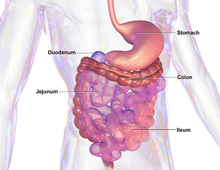| Mucositis | |
|---|---|
 | |
| Illustration of the human gastrointestinal tract | |
| Specialty | Gastroenterology |
| Symptoms | Red burn-like sores or ulcers throughout the mouth |
| Causes | chemotherapy and radiotherapy treatment |
Mucositis is the painful inflammation and ulceration of the mucous membranes lining the digestive tract, usually as an adverse effect of chemotherapy and radiotherapy treatment for cancer.[1] Mucositis can occur anywhere along the gastrointestinal (GI) tract, but oral mucositis refers to the particular inflammation and ulceration that occurs in the mouth. Oral mucositis is a common and often debilitating complication of cancer treatment.[2]
Oral and gastrointestinal (GI) mucositis affects almost all patients undergoing high-dose chemotherapy and hematopoietic stem cell transplantation (HSCT), 80% of patients with cancers of the head and neck receiving radiotherapy, and a wide range of patients receiving chemotherapy. Alimentary tract mucositis increases mortality and morbidity and contributes to rising health care costs.[3]
For most cancer treatment, about 5–15% of patients get mucositis. However, with 5-fluorouracil (5-FU), up to 40% get mucositis, and 10–15% get grade 3–4 oral mucositis.[3] Irinotecan is associated with severe GI mucositis in over 20% of patients. Seventy-five to eighty percent of bone marrow transplantation recipients experience mucositis, of which oral mucositis is the most common and most debilitating, especially when melphalan is used. In grade 3 oral mucositis, the patient is unable to eat solid food, and in grade 4, the patient is unable to consume liquids as well.[3]
Radiotherapy to the head and neck or to the pelvis or abdomen is associated with Grade 3 and Grade 4 oral or GI mucositis, respectively, often exceeding 50% of patients. Among patients undergoing head and neck radiotherapy, pain and decreased oral function may persist long after the conclusion of therapy. Fractionated radiation dosage increases the risk of mucositis to > 70% of patients in most trials. Oral mucositis is particularly profound and prolonged among HSCT recipients who receive total-body irradiation.[3]
- ^ Ridge JA, Glisson BS, Lango MN, et al. "Head and Neck Tumors" Archived 2009-07-20 at the Wayback Machine in Pazdur R, Wagman LD, Camphausen KA, Hoskins WJ (Eds) Cancer Management: A Multidisciplinary Approach Archived 2013-10-04 at the Wayback Machine. 11 ed. 2008.
- ^ Sonis, S. T. (2004). "Oral mucositis in cancer therapy". The Journal of Supportive Oncology. 2 (6 Suppl 3): 3–8. PMID 15605918.
- ^ a b c d Rubenstein, Edward B.; Peterson, Douglas E.; Schubert, Mark; Keefe, Dorothy; McGuire, Deborah; Epstein, Joel; Elting, Linda S.; Fox, Philip C.; Cooksley, Catherine; Sonis, Stephen T.; Mucositis Study Section of the Multinational Association for Supportive Care in Cancer.; International Society for Oral Oncology. (2004). "Clinical practice guidelines for the prevention and treatment of cancer therapy-induced oral and gastrointestinal mucositis". Cancer. 100 (9 Suppl): 2026–46. doi:10.1002/cncr.20163. PMID 15108223. S2CID 24313893.